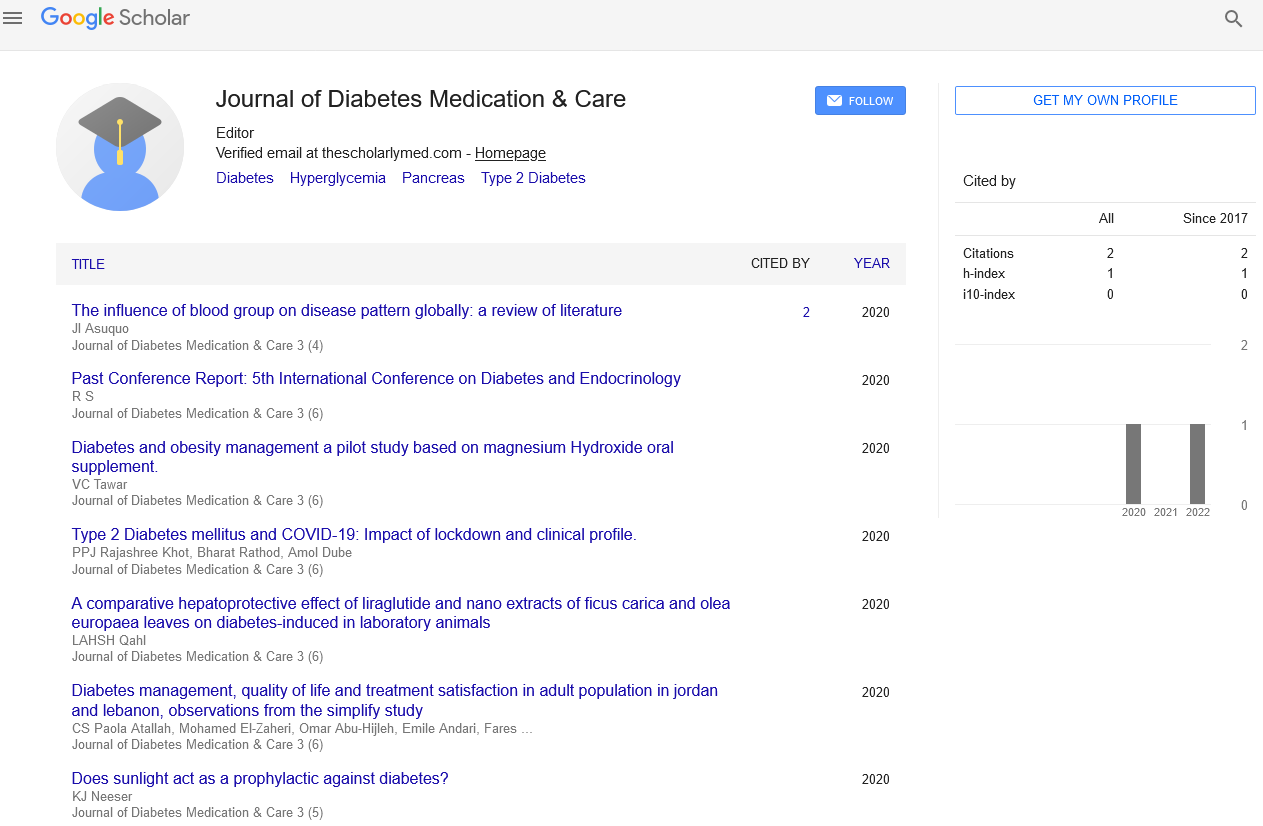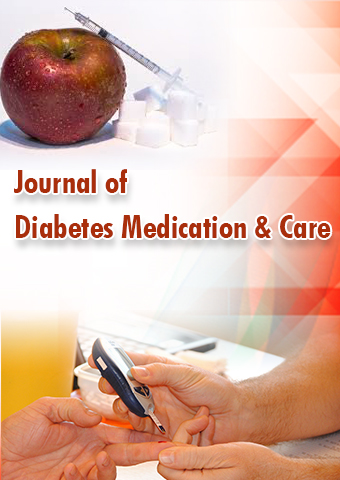Perspective - Journal of Diabetes Medication & Care (2023) Volume 6, Issue 5
A Holistic Approach to Prediabetes Management: Taking Charge of Your Health
- Corresponding Author:
- Robin Augstine
Department of Diabetes and Research, Unversity of Bartonville, Texas, USA
E-mail: rag@gmail.com
Received: 04-Sep-2023, Manuscript No. jdmc-23-119708; Editor assigned: 07-Sep-2023, PreQC No. jdmc-23-119708 (PQ); Reviewed: 21-Sep-2023, QC No. jdmc-23-119708; Revised: 03-Oct-2023, Manuscript No. jdmc-23-119708 (R); Published: 11-Oct-2023, DOI: 10.37532/jdmc.2023.6(5).129-131
Abstract
Diabetes mellitus, commonly known as diabetes, is a global health epidemic affecting millions of people worldwide. It is a complex and multifaceted disease that has a profound impact on the lives of those affected. In this comprehensive article, we will delve deep into the various aspects of diabetes, from its definition and types to its causes, symptoms, complications, management, and prevention strategies.
Introduction
Diabetes mellitus, commonly known as diabetes, is a global health epidemic affecting millions of people worldwide. It is a complex and multifaceted disease that has a profound impact on the lives of those affected. In this comprehensive article, we will delve deep into the various aspects of diabetes, from its definition and types to its causes, symptoms, complications, management, and prevention strategies.
Description
Understanding diabetes mellitus
Diabetes mellitus is a chronic metabolic disorder characterized by elevated blood sugar levels, also known as hyperglycemia. This condition results from either the body’s inability to produce enough insulin or the improper utilization of insulin produced. Insulin is a hormone produced by the pancreas, which plays a crucial role in regulating blood sugar levels. When the body fails to produce or effectively use insulin, it disrupts the balance of glucose in the bloodstream.
Types of diabetes mellitus
There are several types of diabetes mellitus, each with distinct characteristics and causes:
Type 1 diabetes: Type 1 diabetes, often referred to as juvenile diabetes, is an autoimmune disease in which the immune system mistakenly attacks and destroys the insulin-producing beta cells in the pancreas. As a result, individuals with type 1 diabetes require lifelong insulin therapy to manage their blood sugar levels.
Type 2 diabetes: Type 2 diabetes is the most common form of diabetes, accounting for the majority of cases. It is primarily associated with lifestyle factors, such as poor diet, lack of physical activity, and obesity. In type 2 diabetes, the body becomes resistant to the effects of insulin, and over time, the pancreas may not produce enough insulin to meet the body’s demands.
Gestational diabetes: This type of diabetes occurs during pregnancy when the body cannot produce enough insulin to meet the increased demands, leading to elevated blood sugar levels. Gestational diabetes typically resolves after childbirth, but it increases the risk of type 2 diabetes later in life.
Monogenic diabetes: This rare form of diabetes is caused by a mutation in a single gene, resulting in impaired insulin production or utilization. It is often misdiagnosed as type 1 or type 2 diabetes.
Causes of diabetes mellitus
Understanding the root causes of diabetes is essential for effective prevention and management. The causes can vary depending on the type of diabetes:
Type 1 diabetes: The exact cause of type 1 diabetes remains unclear, but it is believed to be an autoimmune response where the body’s immune system mistakenly targets and destroys the insulin-producing beta cells.
Type 2 diabetes: Type 2 diabetes is largely attributed to lifestyle factors, including poor dietary choices, sedentary lifestyles, and obesity. Genetic factors also play a role, as individuals with a family history of type 2 diabetes are at higher risk.
Gestational diabetes: Hormonal changes during pregnancy can affect insulin sensitivity, leading to gestational diabetes in some women.
Monogenic diabetes: This form of diabetes is caused by specific genetic mutations, and it is usually inherited from one or both parents.
Signs and symptoms of diabetes mellitus
The symptoms of diabetes can vary from person to person and may depend on the type of diabetes and the individual’s overall health. Common symptoms include:
Frequent urination: Excess glucose in the bloodstream leads to increased urine production.
Excessive thirst: Dehydration from frequent urination can cause intense thirst.
Unexplained weight loss: In type 1 diabetes, the body may break down fat and muscle for energy due to insufficient insulin.
Increased hunger: The body’s cells may not be receiving the energy they need from glucose, leading to persistent hunge.
Blurred vision: High blood sugar levels can affect the eye’s lens, leading to vision problems.
Fatigue: The body’s inability to effectively use glucose can result in low energy levels.
Slow wound healing: High blood sugar impairs the body’s ability to heal wounds and fight infections.
Tingling or numbness: Diabetes can damage nerves, leading to tingling or numbness in the extremities.
It is essential to consult a healthcare professional for a proper diagnosis if these symptoms are present.
Complications of diabetes mellitus
Uncontrolled diabetes can lead to a wide range of complications, affecting nearly every organ and system in the body. Some of the most common complications include:
Cardiovascular issues: Diabetes increases the risk of heart disease, stroke, and high blood pressure.
Kidney disease: Diabetes is a leading cause of kidney failure.
Eye problems: Diabetes can cause retinopathy, cataracts, and glaucoma, potentially leading to blindness.
Nerve damage: Diabetic neuropathy can cause pain, tingling, and numbness in the extremities.
Foot complications: Poor circulation and nerve damage can lead to foot ulcers and, in severe cases, amputation.
Skin conditions: Diabetes can lead to skin problems, including bacterial and fungal infections.
Alzheimer’s disease: Some studies suggest a link between type 2 diabetes and an increased risk of Alzheimer’s disease.
Complications during pregnancy: Gestational diabetes can lead to complications during pregnancy and childbirth.
Management of diabetes mellitus
Effective management of diabetes is crucial in preventing complications and maintaining a good quality of life. The management approach may vary depending on the type of diabetes and individual circumstances:
Lifestyle modifications: For type 2 diabetes, lifestyle changes play a central role. These include maintaining a healthy diet, engaging in regular physical activity, and achieving and maintaining a healthy weight.
Medication: Type 2 diabetes can often be managed with oral medications or injectable insulin. Type 1 diabetes requires lifelong insulin therapy.
Blood sugar monitoring: Regular monitoring of blood sugar levels helps individuals and healthcare providers adjust treatment plans as needed.
Dietary management: A balanced diet with a focus on complex carbohydrates, fiber, and portion control is essential for managing blood sugar levels.
Physical activity: Regular exercise helps improve insulin sensitivity and overall health. It is a cornerstone of type 2 diabetes management.
Stress management: Stress can affect blood sugar levels, so stress reduction techniques like meditation and yoga can be beneficial.
Regular checkups: Regular medical checkups are essential to monitor the condition, assess complications, and adjust treatment plans.
Conclusion
Diabetes mellitus is a complex and widespread health issue with far-reaching consequences for those affected. While it poses significant challenges, it is important to remember that diabetes can be effectively managed, and in many cases, prevented. A combination of a healthy lifestyle, proper medical care, and ongoing research into better treatments and prevention strategies offers hope for a brighter future in the fight against diabetes. By understanding the causes, symptoms, complications, management, and prevention of diabetes, we can take the necessary steps to protect our health and the health of future generations.

